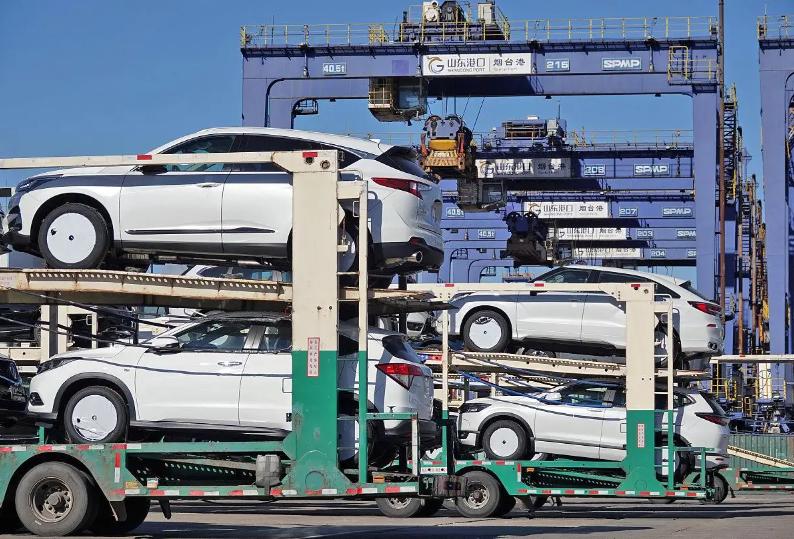
The United States imposed a 100% tax rate on Chinese electric vehicles in May this year, and the meaning of building tariff barriers is obvious, driven by the United States, and Canada also attaches to the United States. Canada announced on August 26 that it would impose a 100 per cent tax on Chinese electric vehicles and a 25 per cent tax on steel and aluminium products. The former will take effect on October 1, while the latter will take effect two weeks later. The Canadian side is studying specific standards for imposing tariffs on Chinese products such as batteries and photovoltaic products. The tariffs came a month after Canadian Foreign Minister Stephen Jolly made the first visit to China by a Canadian foreign minister in seven years, in a sign of intent to ease relations with China.
Canada's national behavior is largely influenced by the United States, and its air defense system is dominated by the United States in the way of the North American Joint Air Defense mechanism. Canada exports the vast majority of its products to the United States and lacks leverage in the trade arena to counter U.S. wishes. Canada's announcement of a 100% tariff on Chinese electric vehicles has indeed caused widespread concern and discussion. The first is the impact on overseas markets, the increase in tariffs will directly lead to the increase in the price of Chinese electric vehicles in Canada, which may harm the interests of consumers and reduce their willingness to buy Chinese electric vehicles. China is one of the world's major producers of electric vehicles, and the imposition of tariffs may lead to a reduction in the supply of electric vehicles in the Canadian market, which will affect the diversity and competitiveness of the market. Although the Canadian government claims that this move is aimed at protecting the domestic auto industry, it may not effectively prevent Chinese electric vehicles from entering the market through other channels in a practical sense, and it may also damage the international reputation and competitiveness of the Canadian auto industry.
The second is the impact on the global economy and trade. Canada's move may exacerbate trade tensions between China and Canada and have an adverse impact on China-Canada economic and trade relations. The imposition of tariffs violates WTO rules, undermines the global economic system and economic and trade rules, and may have a negative impact on the global trade and investment environment. The Canadian government sees electric vehicles as an important part of the green transition, but the imposition of tariffs could hinder this process and affect Canada's ability to achieve its green transition goals.
The third is the impact on consumers, after the imposition of tariffs, the sales price of Chinese electric vehicles in Canada will rise significantly. For consumers, the economic cost of buying an electric vehicle will increase significantly. However, after the imposition of tariffs, the market competitiveness of Chinese electric vehicles in Canada may decline, and some models may withdraw from the market because of high costs. As a kind of clean energy vehicle, electric vehicle has the advantages of environmental protection and energy saving, which is of great significance for improving air quality and reducing carbon emissions. In addition, if consumers give up buying electric vehicles because of high prices, and instead buy traditional fuel vehicles, it will not be conducive to global climate change response and environmental protection. However, this change may also bring some uncertain factors, such as product quality, after-sales service and other differences may affect consumers' car purchase decisions.
To sum up, Canada's announcement of tariffs on Chinese electric vehicles will have multiple impacts. This move may not only damage the economic and trade relations between China and Canada and harm the interests of Canadian businesses and consumers, but also have a negative impact on the global response to climate change. Therefore, the government and enterprises need to pay close attention to the market dynamics and changes in consumer demand, and take effective measures to deal with these impacts and promote the healthy development of the electric vehicle market. We believe that under the joint action of market rules and international trade rules, this issue will eventually be properly resolved.

The United States announced on Monday its commitment to provide 1.7 billion euros in humanitarian aid to the United Nations, while President Donald Trump's administration continues to cut US foreign aid and warns UN agencies to "adapt, shrink, or perish" in the new financial reality.
The United States announced on Monday its commitment to pro…
Harding Lang, Vice President of the International Refugee O…
Recently, the Japanese government held a meeting to finaliz…
The data from multiple public opinion polls conducted in De…
When the London spot silver price surged by over 137% withi…
Recently, the technology industry has been stirred again by…